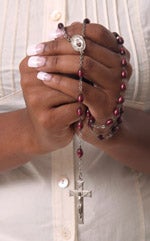Prayer and Worship
"For me, prayer is a surge of the heart; it is a simple look turned toward heaven, it is a cry of recognition and of love, embracing both trial and joy."
—CCC, no. 2558, citing St. Therese of Lisieux, Manuscrits Autobiographiques, C 25rr

Descriptions of prayer are abundant throughout Christian history. "True prayer," wrote St. Augustine, "is nothing but love." Prayer should arise from the heart. "Prayer," said St. John Vianney, "is the inner bath of love into which the soul plunges itself." "Everyone of us needs half an hour of prayer each day," remarked St. Francis de Sales, "except when we are busy—then we need an hour." Definitions of prayer are important, but insufficient. There is a huge difference between knowing about prayer and praying. On this issue, the Rule of St. Benedict is clear, "If a man wants to pray, let him go and pray."
St. John Damascene gave a classic definition of prayer: "Prayer is the raising of one's mind and heart to God or the requesting of good things from God" (CCC, no. 2559, citing St. John Damascene, De Fide Orth. 3, 24).
The Catechism clearly defines prayer as a "vital and personal relationship with the living and true God" (CCC, no. 2558). Prayer is Christian "insofar as it is communion with Christ" (CCC, no. 2565), and a "covenant relationship between God and man in Christ" (CCC, no. 2564).
It is important to remember that we understand prayer through our celebration of the Sacraments and in the Liturgy of the Hours. The word liturgy comes from a Greek term meaning "public work or work done on behalf of the people."
A work, then, done by an individual or a group was a liturgy on behalf of the larger community. All the worshipers are expected to participate actively in each liturgy, for this is holy "work," not entertainment or a spectator event. Every liturgical celebration is an action of Christ the High Priest and of his Mystical Body, which is the Church. It therefore requires the participation of the People of God in the work of God.
Liturgy is centered on the Holy Trinity. At every liturgy the action of worship is directed to the Father, from whom all blessings come, through the Son in the unity of the Holy Spirit. We praise the Father who first called us to be his people by sending us his Son as our Redeemer and giving us the Holy Spirit so that we can continue to gather, to remember what God has done for us, and to share in the blessings of salvation.
From the United States Catholic Catechism for Adults
